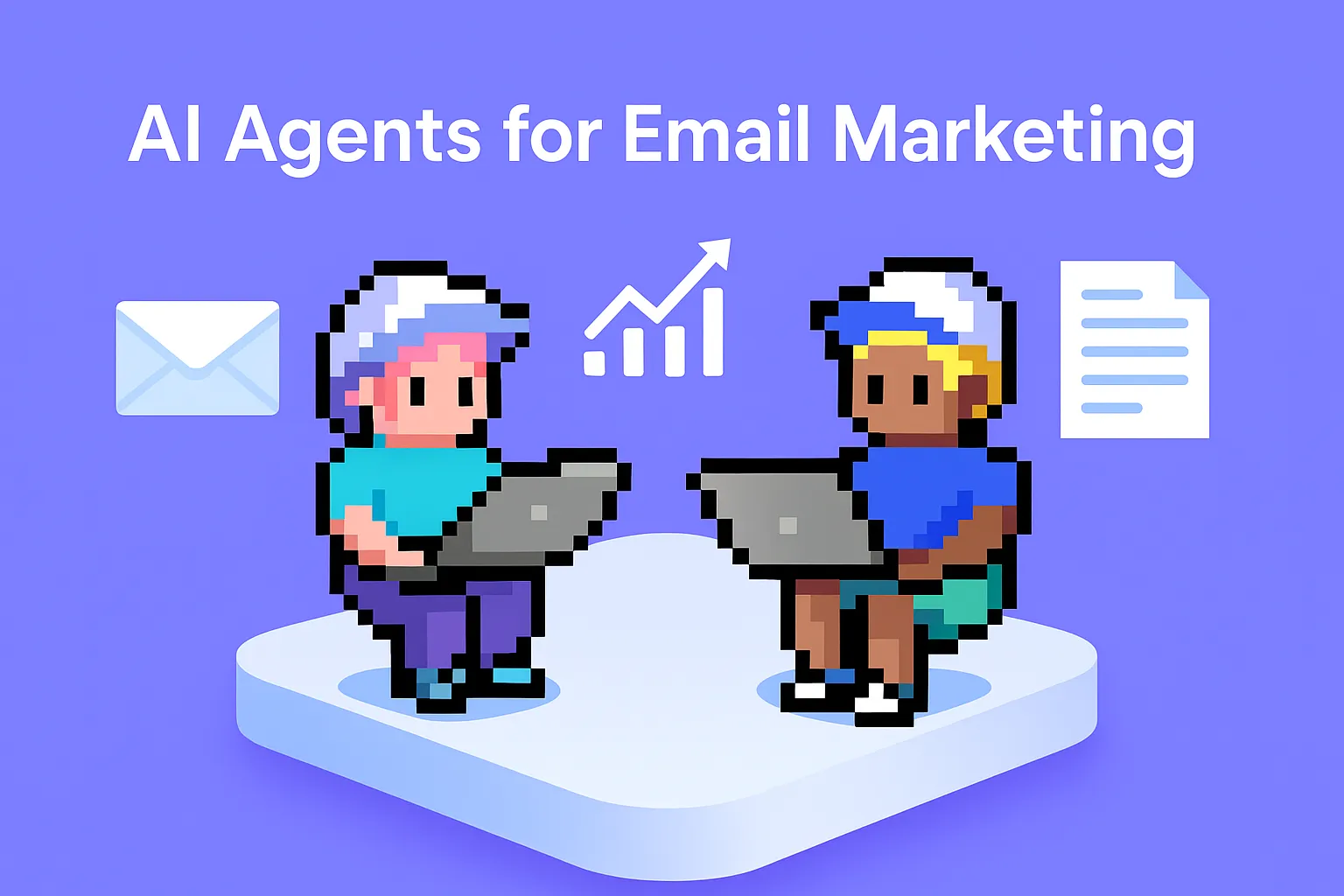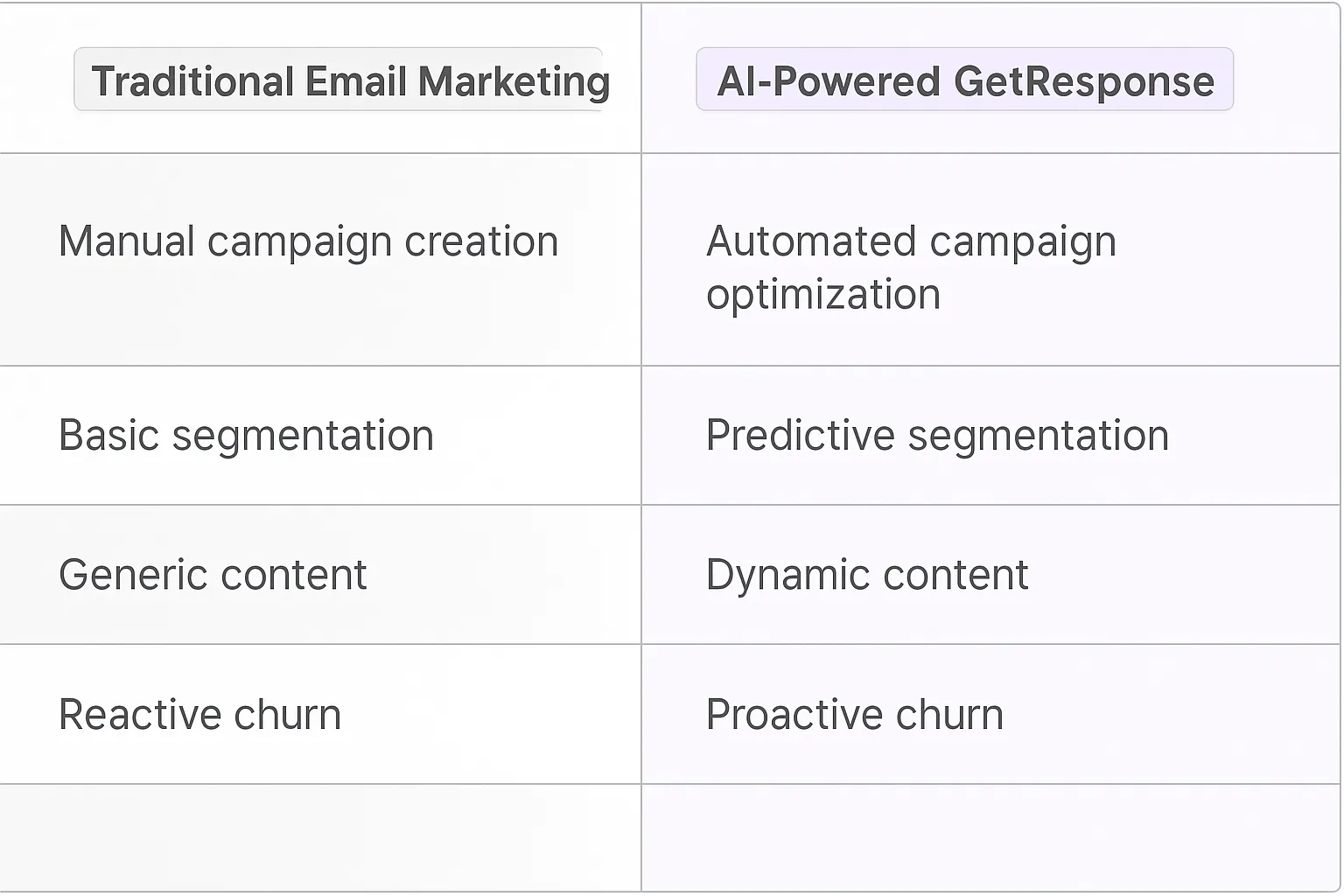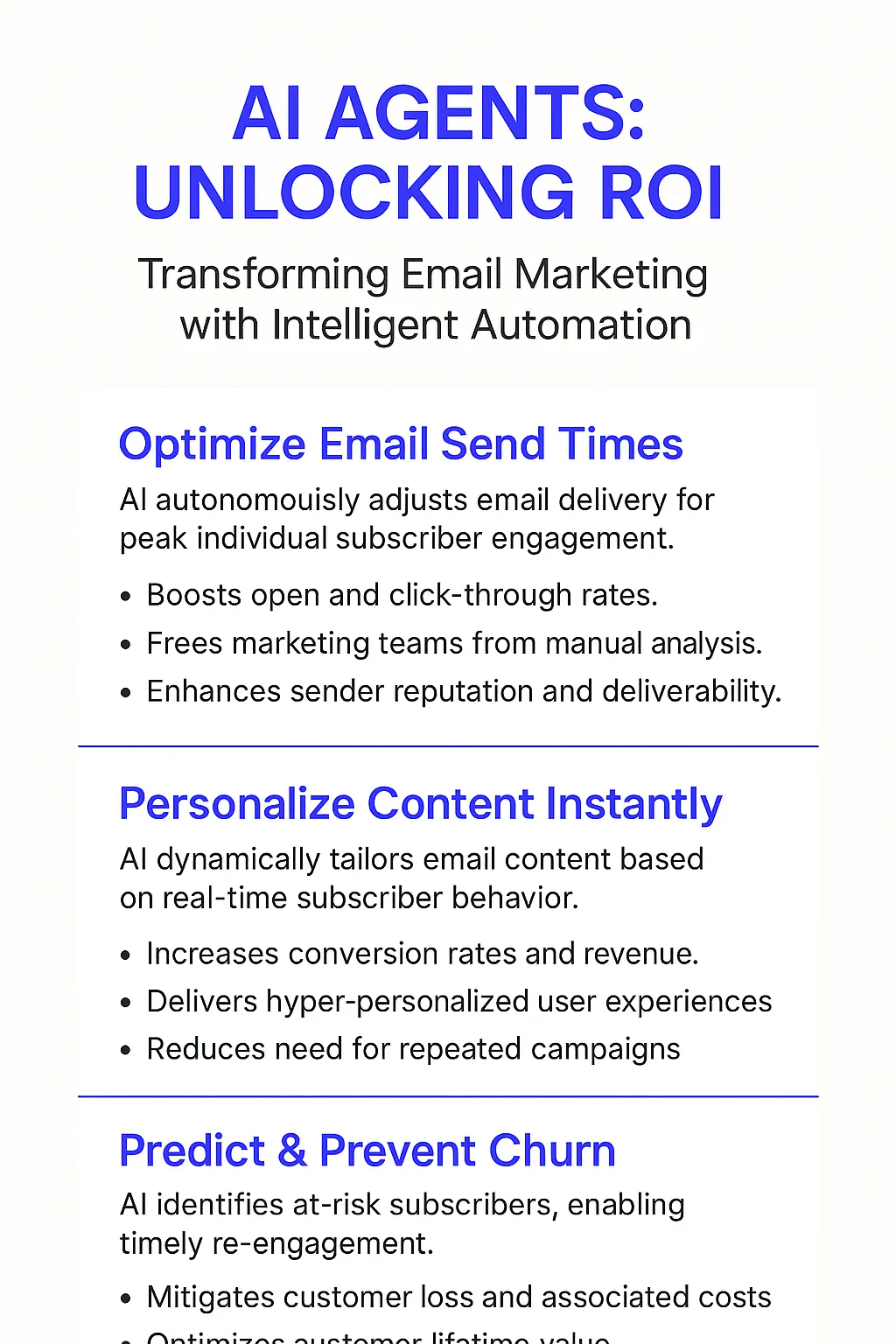GetResponse
Understanding GetResponse's Marketing Platform and AI Integration
GetResponse stands as a comprehensive marketing platform that combines email marketing, landing page creation, and automation capabilities. The platform serves businesses seeking to build meaningful connections with their audience through targeted communications and automated marketing workflows. With the integration of AI Agents, GetResponse has evolved beyond traditional email marketing tools to become an intelligent marketing ecosystem.
Key Features of GetResponse
The platform's core strengths lie in its email marketing automation, landing page builder, and conversion funnel tools. GetResponse offers advanced segmentation capabilities, A/B testing functionality, and detailed analytics tracking. The integration of AI Agents enhances these features by adding predictive analytics, automated content optimization, and intelligent audience targeting. The platform's API architecture enables seamless integration with existing marketing tech stacks, while its intuitive interface makes sophisticated marketing automation accessible to teams of all skill levels.

Benefits of AI Agents for GetResponse
What would have been used before AI Agents?
GetResponse users previously relied on manual email marketing processes that required significant time investment. Marketing teams spent hours crafting individual email sequences, analyzing engagement metrics, and adjusting campaign parameters. They often needed to switch between multiple tools and dashboards to manage their email marketing efforts effectively.
What are the benefits of AI Agents?
AI Agents transform GetResponse into a more intelligent and responsive marketing platform. These digital teammates analyze subscriber behavior patterns and automatically optimize email send times based on when recipients are most likely to engage. They detect subtle trends in open rates and click-through patterns that human marketers might miss.
The real power comes from their ability to dynamically adjust email content and subject lines based on recipient engagement data. Instead of waiting for quarterly reviews to optimize campaigns, AI Agents make real-time adjustments that improve performance daily. They can identify which segments of your audience respond better to different types of content, allowing for more nuanced and effective targeting.
A particularly valuable aspect is their ability to predict subscriber churn before it happens. By analyzing engagement patterns and behavioral signals, AI Agents can flag at-risk subscribers and automatically trigger re-engagement campaigns. This proactive approach helps maintain healthy email lists and improves overall deliverability rates.
For e-commerce integrations, AI Agents excel at creating personalized product recommendations based on both email engagement and website browsing behavior. They can automatically generate and test multiple versions of email content, learning which combinations drive the highest conversion rates for different audience segments.
The automation of routine tasks like list cleaning, bounce handling, and basic customer inquiries frees up marketing teams to focus on strategic initiatives and creative content development. This shift from tactical execution to strategic planning represents a fundamental improvement in how email marketing teams operate.

Potential Use Cases of AI Agents with GetResponse
Email Marketing Optimization
AI agents analyze subscriber behavior patterns and engagement metrics to dynamically adjust email send times and content personalization. They monitor open rates, click-through rates, and conversion data to identify the most effective subject lines and email structures. The agents continuously learn from campaign performance to refine targeting and segmentation strategies.
Landing Page Creation
Digital teammates assist marketers by generating conversion-optimized landing page variations based on historical performance data. They analyze successful page elements, recommend layout improvements, and suggest compelling copy that resonates with specific audience segments. The agents can rapidly test multiple page versions to identify winning combinations.
Automated Lead Scoring
AI agents process subscriber interactions across email campaigns, website visits, and form submissions to develop sophisticated lead scoring models. They identify high-value prospects by analyzing engagement patterns and demographic data, enabling sales teams to focus on the most promising opportunities.
Content Generation and Optimization
The AI analyzes top-performing email content and adapts messaging for different audience segments. It generates personalized product recommendations, creates dynamic content blocks, and optimizes CTAs based on subscriber preferences and past campaign success metrics.
Campaign Performance Analysis
Digital teammates dive deep into campaign metrics to uncover actionable insights. They identify trends in subscriber behavior, segment performance, and content effectiveness. The analysis helps marketers understand which elements drive engagement and conversions across different audience segments.
List Management and Segmentation
AI agents continuously refine subscriber segments based on behavior patterns, engagement levels, and purchase history. They identify inactive subscribers, recommend re-engagement strategies, and maintain list hygiene by flagging potential spam traps or invalid emails.
A/B Testing Optimization
The AI manages complex multivariate tests across email campaigns, analyzing results in real-time to identify winning combinations. It tests subject lines, content blocks, CTAs, and send times simultaneously, accelerating the optimization process and improving campaign performance.
Automated Workflow Creation
Digital teammates design and optimize marketing automation workflows based on subscriber behavior and campaign performance data. They identify optimal trigger points, recommend timing intervals, and suggest personalized content for each automation step.

Industry Use Cases
GetResponse AI agents are transforming how businesses connect with their audiences across multiple sectors. The real power lies in their ability to adapt and scale marketing operations while maintaining personalized customer experiences. Drawing from my experience analyzing growth patterns in tech companies, I've observed that the most successful implementations happen when teams fully integrate these digital teammates into their core processes.
What makes GetResponse's AI capabilities particularly interesting is how they bridge the gap between automated efficiency and human-like engagement. Unlike traditional marketing tools that simply execute predefined rules, these AI agents learn and evolve based on customer interactions, campaign performance, and market dynamics. They're essentially becoming sophisticated marketing partners that understand nuanced customer behaviors and adapt in real-time.
The following industry applications demonstrate how organizations are leveraging GetResponse AI agents to create more meaningful customer connections while reducing operational complexity. Each case represents a distinct way these digital teammates enhance marketing strategies and deliver measurable business impact.
E-commerce Marketing Automation with GetResponse AI
E-commerce businesses face the constant challenge of maintaining personalized customer relationships at scale. GetResponse AI agents transform how online retailers handle their email marketing by learning from customer behavior patterns and purchase history to create highly targeted campaigns.
A mid-sized fashion retailer using GetResponse AI can segment their customer base with unprecedented precision. The AI analyzes past purchase data, browsing patterns, and engagement metrics to identify distinct customer personas - from the trend-conscious early adopters to price-sensitive seasonal shoppers.
The real power emerges in the automated campaign creation process. When new products launch, the AI crafts tailored email content for each segment. For example, VIP customers receive early access previews with exclusive styling tips, while discount-driven shoppers get strategically timed promotions when they're most likely to convert.
The system continuously optimizes subject lines, send times, and content based on real-time performance data. A retailer that previously averaged 15% open rates can see increases to 25-30% through this intelligent optimization. The AI also identifies browse and cart abandonment patterns, triggering perfectly timed recovery emails that feel personal rather than automated.
This level of sophistication in email marketing automation was previously only available to enterprise retailers with large marketing teams. GetResponse AI democratizes these capabilities, allowing smaller e-commerce businesses to compete effectively in the attention economy while maintaining authentic customer relationships.
Educational Course Marketing with GetResponse AI
Online education providers face unique challenges in connecting with prospective students and maintaining engagement throughout the learning journey. GetResponse AI agents excel at identifying critical touchpoints in the student lifecycle, from initial interest to course completion.
A coding bootcamp leveraging GetResponse AI demonstrates the sophisticated potential of this technology. The AI analyzes prospect behavior across multiple channels - website interactions, email engagement, and content downloads - to build detailed learner profiles. It identifies key indicators like technical background, learning pace preferences, and career goals.
The AI then orchestrates multi-touch email sequences that adapt based on individual student signals. When a prospect shows interest in Python courses but hesitates to enroll, the system automatically delivers targeted content showcasing student success stories, job placement rates, and time-limited enrollment incentives.
For enrolled students, the AI monitors engagement patterns and proactively addresses potential dropout risks. If a student's interaction with course materials declines, the system triggers personalized check-in emails with relevant resources and encouragement. Course providers using this approach have seen completion rates improve by 40%.
The technology also excels at scaling personal connections between instructors and students. By analyzing discussion forum activity and assignment submissions, the AI helps course providers identify when human intervention will have the most impact. This creates a hybrid approach where automation handles routine communications while preserving meaningful human interactions.
Most significantly, the AI's ability to segment and target different learning styles means course providers can move beyond one-size-fits-all marketing. Self-paced learners receive different messaging than those who thrive in cohort-based programs. This level of personalization was previously impossible for all but the largest educational institutions.
Considerations and Challenges
Implementing GetResponse AI agents requires careful planning and awareness of several key factors that can impact success. The integration process involves both technical and operational hurdles that teams need to navigate.
Technical Challenges
API integration complexity often emerges as the first major hurdle. GetResponse's API architecture requires precise configuration and proper authentication setup. Teams frequently encounter rate limiting issues when scaling operations, necessitating robust error handling and request management systems.
Data synchronization between GetResponse and existing systems presents another technical challenge. Real-time updates and maintaining data consistency across platforms demand careful architecture planning. Custom field mapping and contact property alignment need thorough validation to prevent data loss or corruption.
Operational Challenges
Training team members to effectively work alongside AI agents requires significant investment. Marketing teams must develop new workflows that leverage AI capabilities while maintaining human oversight of campaign performance and customer interactions.
Content quality control becomes more complex with AI-generated materials. Organizations need to establish clear review processes and guidelines for AI-produced content to maintain brand voice and messaging consistency. This includes setting up approval workflows and defining content parameters.
Resource allocation presents another operational consideration. Teams must balance automation benefits against the time investment needed for setup, monitoring, and optimization. The initial configuration period often requires dedicated staff hours that could impact other marketing initiatives.
Privacy and Compliance
Data handling regulations like GDPR and CCPA create additional implementation layers. Teams must ensure AI agents process customer data within compliance boundaries and maintain proper documentation of data flows. This includes setting up appropriate data retention policies and consent management systems.
Regular compliance audits become necessary to verify AI operations align with evolving privacy requirements. Organizations need to maintain detailed logs of AI actions and establish clear accountability chains for automated decisions.
Transforming Marketing Through AI-Powered Automation
GetResponse AI Agents mark a fundamental shift in how marketing teams approach automation and customer engagement. The technology's ability to analyze complex behavioral patterns, generate personalized content, and optimize campaigns in real-time delivers measurable improvements in marketing performance. While implementation challenges exist, particularly around technical integration and compliance, the benefits of enhanced targeting, improved engagement rates, and operational efficiency make AI Agents an increasingly essential component of modern marketing operations. Organizations that successfully integrate these digital teammates position themselves to build stronger customer relationships while reducing manual workload on marketing teams.













